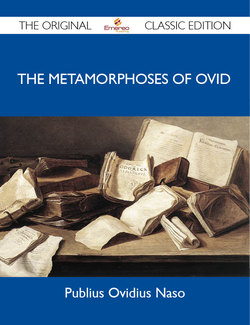Читать книгу The Metamorphoses of Ovid - The Original Classic Edition - Naso Publius - Страница 2
Оглавлениеwas the son of Arestor. He is supposed by some to have been the fourth king of Argos after Inachus, and to have been a person of great wisdom and penetration, on account of which he was said to have a hundred
eyes. Io most probably was committed to his charge, and he watched over her with the greatest care.
It is impossible to divine the reason why his eyes were said to have been set by Juno in the tail of the peacock; though, perhaps, the circumstance has no other foundation than the resemblance of the human eye to the spots in the tail of that bird, which was consecrated to
Juno. Besides, if Juno is to be considered the symbol of Air, or
AEther, through which light is transmitted to us, it is not surprising that the ancients bestowed so many eyes upon the bird which was consecrated to her.
FABLE XVII. [I.724-779]
85
Io, terrified and maddened with dreadful visions, runs over many regions, and stops in Egypt, when Juno, at length, being pacified, restores her to her former shape, and permits her to be worshipped there, under the name of Isis.
Immediately, she was inflamed with rage, and deferred not the time of
{expressing} her wrath; and she presented a dreadful Fury before the eyes and thoughts of the Argive mistress,[111] and buried in her bosom invisible stings, and drove her, in her fright, a wanderer through the whole earth. Thou, O Nile, didst remain, as the utmost boundary of her long wanderings. Soon as she arrived there, she fell upon her knees, placed on the edge of the bank, and raising herself up, with her neck thrown back, and casting to Heaven those looks which then alone she
could, by her groans, and her tears, and her mournful lowing, she seemed to be complaining of Jupiter, and to be begging an end of her sorrows.
He, embracing the neck of his wife with his arms, entreats her, at length, to put an end to her punishment; and he says, "Lay aside thy fears for the future; she shall never {more} be the occasion of any trouble to thee;" and {then} he bids the Stygian waters to hear this
{oath}. As soon as the Goddess is pacified, {Io} receives her former
shape, and she becomes what she was before; the hairs flee from off of her body, her horns decrease, and the orb of her eye becomes less; the opening of her jaw is contracted; her shoulders and her hands return, and her hoof, vanishing, is disposed of into five nails; nothing of the
cow remains to her, but the whiteness of her appearance; and the Nymph, contented with the service of two feet, is raised erect {on them}; and
{yet} she is afraid to speak, lest she should low like a cow, and
timorously tries again the words {so long} interrupted. Now, as a
86
Goddess, she is worshipped by the linen-wearing throng[112] {of Egypt}.
To her, at length, Epaphus[113] is believed to have been born from the
seed of great Jove, and throughout the cities he possesses temples
joined to {those of} his parent. Phaeton, sprung from the Sun, was equal to him in spirit and in years; whom formerly, as he uttered great
boasts, and yielded not {at all} to him, and proud of his father, Phoebus, the grandson of Inachus could not endure; and said, "Thou,
{like} a madman, believest thy mother in all things, and art puffed up with the conceit of an imaginary father."
Phaeton blushed, and in shame repressed his resentment; and he reported to his mother, Clymene,[114] the reproaches of Epaphus; and said, "Mother, to grieve thee still more, I, the free, the bold {youth}, was
silent; I am ashamed both that these reproaches can be uttered against us, and that they cannot be refuted; but do thou, if only I am born of a divine race, give me some proof of so great a descent, and claim me for heaven." {Thus} he spoke, and threw his arms around the neck of his mother; and besought her, by his own head and by that of Merops,[115] and by the nuptial torches of his sisters, that she would give him some token of his real father.
It is a matter of doubt whether Clymene was more moved by the entreaties of Phaeton, or by resentment at the charge made against her; and she
raised both her arms to heaven, and, looking up to the light of the Sun, she said, "Son, I swear to thee, by this beam, bright with shining rays, which both hears and sees us, that thou, that thou, {I say}, wast
begotten by this Sun, which thou beholdest; by this {Sun}, which governs
the world. If I utter an untruth, let him deny himself to be seen by me,
87
and let this light prove the last for my eyes. Nor will it be any prolonged trouble for thee to visit thy father's dwelling; the abode where he arises is contiguous to our regions.[116] If only thy inclination disposes thee, go forth, and thou shalt inquire of himself."
Phaeton immediately springs forth, overjoyed, upon these words of his mother, and reaches the skies in imagination; and he passes by his own
AEthiopians, and the Indians situate beneath the rays of the Sun,[117]
and briskly wends his way to the rising of his sire.
